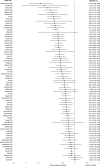Effectiveness of physical activity interventions for improving depression, anxiety and distress: an overview of systematic reviews
- PMID: 36796860
- PMCID: PMC10579187
- DOI: 10.1136/bjsports-2022-106195
Effectiveness of physical activity interventions for improving depression, anxiety and distress: an overview of systematic reviews
Abstract
Objective: To synthesise the evidence on the effects of physical activity on symptoms of depression, anxiety and psychological distress in adult populations.
Design: Umbrella review.
Data sources: Twelve electronic databases were searched for eligible studies published from inception to 1 January 2022.
Eligibility criteria for selecting studies: Systematic reviews with meta-analyses of randomised controlled trials designed to increase physical activity in an adult population and that assessed depression, anxiety or psychological distress were eligible. Study selection was undertaken in duplicate by two independent reviewers.
Results: Ninety-seven reviews (1039 trials and 128 119 participants) were included. Populations included healthy adults, people with mental health disorders and people with various chronic diseases. Most reviews (n=77) had a critically low A MeaSurement Tool to Assess systematic Reviews score. Physical activity had medium effects on depression (median effect size=-0.43, IQR=-0.66 to -0.27), anxiety (median effect size=-0.42, IQR=-0.66 to -0.26) and psychological distress (effect size=-0.60, 95% CI -0.78 to -0.42), compared with usual care across all populations. The largest benefits were seen in people with depression, HIV and kidney disease, in pregnant and postpartum women, and in healthy individuals. Higher intensity physical activity was associated with greater improvements in symptoms. Effectiveness of physical activity interventions diminished with longer duration interventions.
Conclusion and relevance: Physical activity is highly beneficial for improving symptoms of depression, anxiety and distress across a wide range of adult populations, including the general population, people with diagnosed mental health disorders and people with chronic disease. Physical activity should be a mainstay approach in the management of depression, anxiety and psychological distress.
Prospero registration number: CRD42021292710.
Keywords: anxiety; depression; exercise; physical activity; stress, physiological.
© Author(s) (or their employer(s)) 2023. Re-use permitted under CC BY-NC. No commercial re-use. See rights and permissions. Published by BMJ.
Conflict of interest statement
Competing interests: None declared.
Figures


References
-
- World Health Organization . Depression and other common mental disorders: global health estimates. licence: CC BY-NC-SA 3.0 IGO. Geneva: World Health Organization, 2017.
-
- Institute for Health Metrics and Evaluation . Global health data exchange 2019. University of Washington, 2022.
-
- Australian Bureau of Statistics . National study of mental health and wellbeing, 2021-2011. Australian Government, 2022. Available: url:%20https://www.abs.gov.au/statistics/health/mental-health/national-s...
Publication types
MeSH terms
LinkOut - more resources
Full Text Sources
Other Literature Sources
Medical
